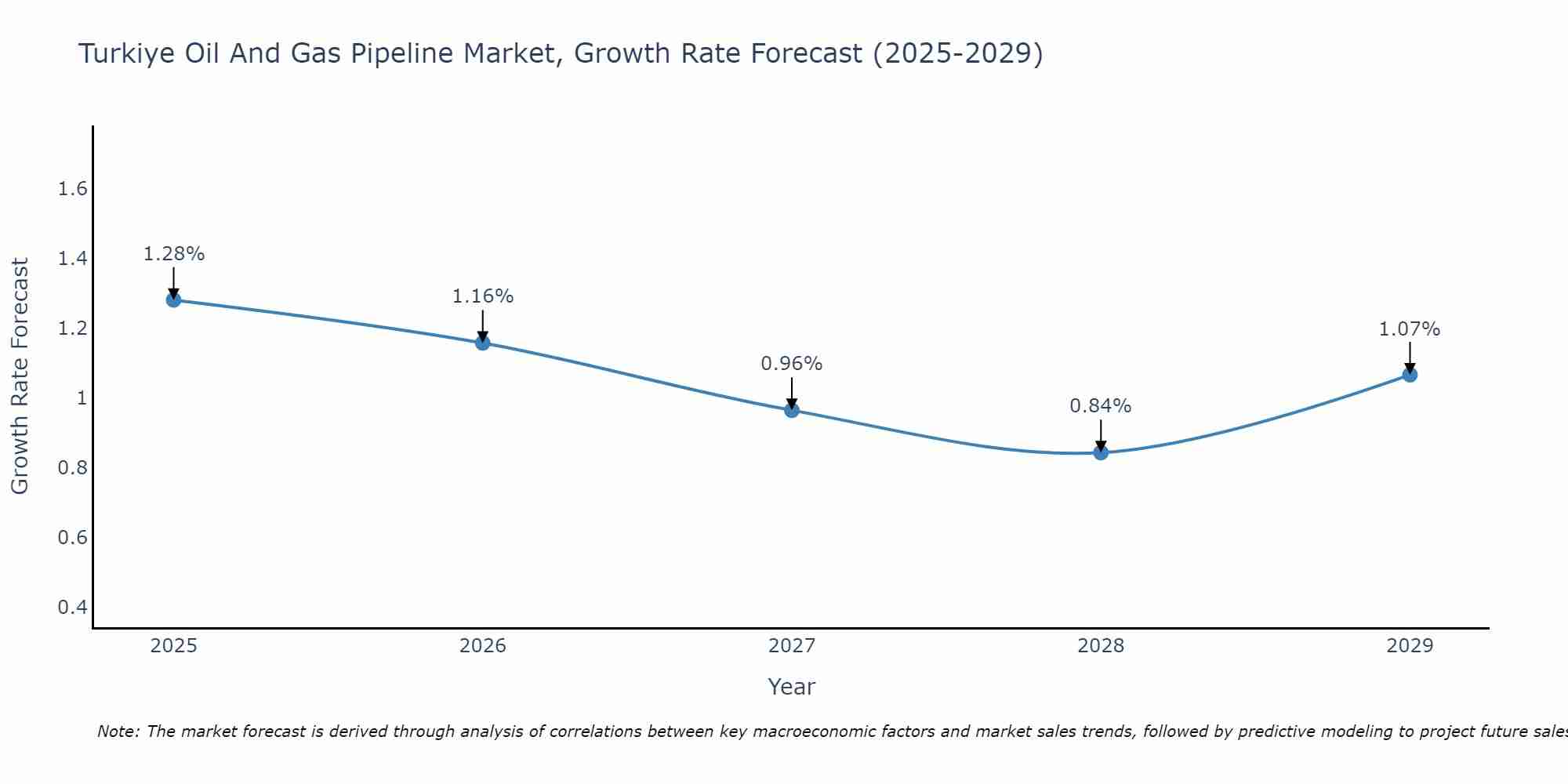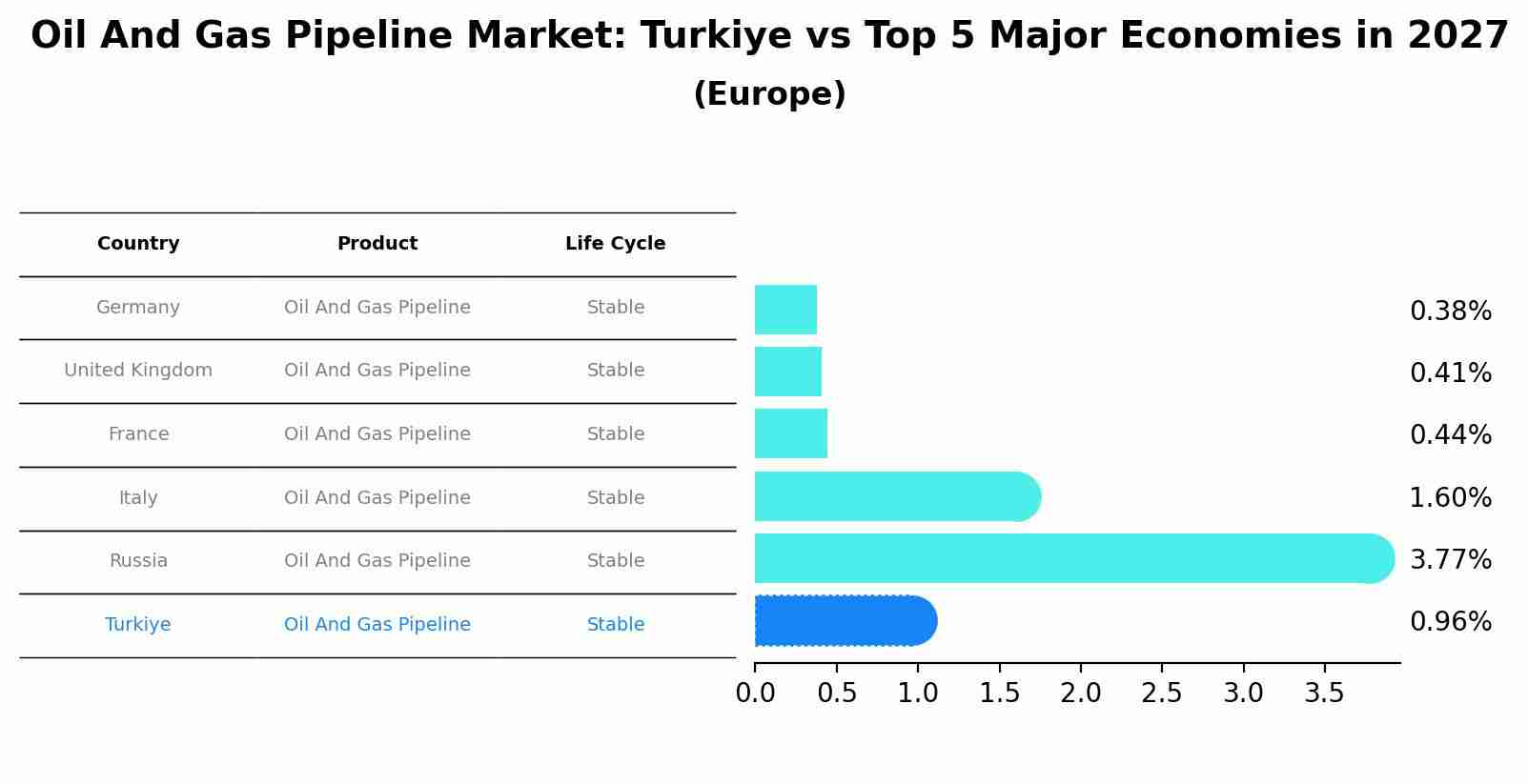Turkey Oil And Gas Pipeline Market Outlook | COVID-19 IMPACT, Size, Industry, Growth, Value, Trends, Revenue, Share, Analysis, Companies & Forecast
| Product Code: ETC377318 | Publication Date: Aug 2022 | Updated Date: Jul 2025 | Product Type: Market Research Report | |
| Publisher: 6Wresearch | Author: Shubham Deep | No. of Pages: 75 | No. of Figures: 35 | No. of Tables: 20 |
Turkiye Oil And Gas Pipeline Market Size Growth Rate
The Turkiye Oil And Gas Pipeline Market is projected to witness mixed growth rate patterns during 2025 to 2029. Beginning strongly at 1.28% in 2025, growth softens to 1.07% in 2029.

Oil And Gas Pipeline Market: Turkiye vs Top 5 Major Economies in 2027 (Europe)
Turkiye's Oil And Gas Pipeline market is anticipated to experience a stable growth rate of 0.96% by 2027, reflecting trends observed in the largest economy Germany, followed by United Kingdom, France, Italy and Russia.

Turkey Oil And Gas Pipeline Market Synopsis
The Turkey Oil and Gas Pipeline Market is a crucial component of the country`s energy infrastructure, facilitating the transportation of oil and gas resources. The market has witnessed significant growth in recent years, driven by increasing energy demand, government initiatives to diversify energy sources, and the country`s strategic location as a transit hub between Europe and Asia. Key players in the market include national oil companies, international energy companies, and pipeline operators. Major pipeline projects such as the Trans-Anatolian Natural Gas Pipeline (TANAP) and the TurkStream pipeline have bolstered Turkey`s position as a key player in the regional energy landscape. Despite challenges such as geopolitical tensions and regulatory issues, the Turkey Oil and Gas Pipeline Market is poised for further expansion to meet the growing energy needs of the country and the wider region.
Turkey Oil And Gas Pipeline Market Trends
The current trends in the Turkey Oil and Gas Pipeline Market include a growing emphasis on pipeline modernization and expansion projects to meet the increasing demand for energy transportation within the country and for export purposes. The implementation of advanced technologies such as smart monitoring systems and automation to enhance the efficiency and safety of pipeline operations is also a key trend. Additionally, there is a focus on improving the sustainability of pipelines through the adoption of environmentally friendly practices and the integration of renewable energy sources. Moreover, collaborations and partnerships between key players in the industry to leverage expertise and resources for the development of new pipeline infrastructure are gaining momentum in the Turkey Oil and Gas Pipeline Market.
Turkey Oil And Gas Pipeline Market Challenges
In the Turkey Oil and Gas Pipeline Market, challenges include geopolitical tensions impacting project feasibility and timelines, regulatory uncertainties affecting investment decisions, and competition with alternative energy sources. Infrastructure constraints, such as limited pipeline capacity and aging pipelines, also pose challenges for efficient transportation of oil and gas. Additionally, fluctuating global oil prices and the need for substantial investments in pipeline maintenance and upgrades further complicate the market landscape. Environmental concerns and the push for sustainability are driving the industry towards cleaner energy solutions, adding another layer of complexity to the market. Overall, navigating these challenges requires strategic planning, collaboration with stakeholders, and adaptation to evolving market dynamics.
Turkey Oil And Gas Pipeline Market Investment Opportunities
The Turkey Oil and Gas Pipeline Market presents promising investment opportunities due to the country`s strategic location as an energy hub connecting Europe and Asia. With increasing energy demand in the region, there is a growing need for infrastructure development, including the construction of new pipelines and the expansion of existing ones. Investing in pipeline projects in Turkey offers potential for long-term returns, supported by stable government policies and agreements with neighboring countries for energy cooperation. Additionally, advancements in technology and the adoption of more efficient and cost-effective pipeline systems further enhance the attractiveness of this market for investors looking to capitalize on the growing energy sector in the region.
Jordan Agar Market Government Policies
The Turkish government has implemented various policies to promote the development of the oil and gas pipeline market in the country. These policies include encouraging foreign investment through partnerships with international companies, promoting energy diversification and security, enhancing infrastructure development to support pipeline projects, and ensuring regulatory frameworks that promote efficiency and transparency in the sector. Additionally, Turkey aims to leverage its strategic geographical location to become a key energy hub by facilitating the transport of oil and gas from producing regions to international markets. The government also emphasizes the importance of sustainability and environmental protection in the development of the oil and gas pipeline market to align with global standards and reduce the impact on the environment.
Turkey Oil And Gas Pipeline Market Future Outlook
The future outlook for the Turkey Oil and Gas Pipeline Market appears promising with potential growth opportunities driven by increasing energy demand, infrastructure development projects, and strategic geographical positioning as a bridge between energy-rich regions and major consumer markets. The country`s focus on diversifying energy sources and reducing dependency on imports is expected to drive investments in pipeline infrastructure. Additionally, Turkey`s role as a key transit hub for oil and gas supplies from the Middle East and Central Asia further enhances its importance in the global energy landscape. However, challenges such as geopolitical uncertainties, regulatory changes, and environmental concerns could impact the market`s growth trajectory. Overall, the Turkey Oil and Gas Pipeline Market is poised for expansion, supported by ongoing developments in the energy sector and efforts to enhance energy security.
Key Highlights of the Report:
- Turkey Oil And Gas Pipeline Market Outlook
- Market Size of Turkey Oil And Gas Pipeline Market, 2021
- Forecast of Turkey Oil And Gas Pipeline Market, 2031
- Historical Data and Forecast of Turkey Oil And Gas Pipeline Revenues & Volume for the Period 2018 - 2031
- Turkey Oil And Gas Pipeline Market Trend Evolution
- Turkey Oil And Gas Pipeline Market Drivers and Challenges
- Turkey Oil And Gas Pipeline Price Trends
- Turkey Oil And Gas Pipeline Porter's Five Forces
- Turkey Oil And Gas Pipeline Industry Life Cycle
- Historical Data and Forecast of Turkey Oil And Gas Pipeline Market Revenues & Volume By Location of Deployment for the Period 2018 - 2031
- Historical Data and Forecast of Turkey Oil And Gas Pipeline Market Revenues & Volume By Onshore for the Period 2018 - 2031
- Historical Data and Forecast of Turkey Oil And Gas Pipeline Market Revenues & Volume By Offshore for the Period 2018 - 2031
- Historical Data and Forecast of Turkey Oil And Gas Pipeline Market Revenues & Volume By Type for the Period 2018 - 2031
- Historical Data and Forecast of Turkey Oil And Gas Pipeline Market Revenues & Volume By Crude Oil Pipeline for the Period 2018 - 2031
- Historical Data and Forecast of Turkey Oil And Gas Pipeline Market Revenues & Volume By Gas Pipeline for the Period 2018 - 2031
- Turkey Oil And Gas Pipeline Import Export Trade Statistics
- Market Opportunity Assessment By Location of Deployment
- Market Opportunity Assessment By Type
- Turkey Oil And Gas Pipeline Top Companies Market Share
- Turkey Oil And Gas Pipeline Competitive Benchmarking By Technical and Operational Parameters
- Turkey Oil And Gas Pipeline Company Profiles
- Turkey Oil And Gas Pipeline Key Strategic Recommendations
Frequently Asked Questions About the Market Study (FAQs):
- Single User License$ 1,995
- Department License$ 2,400
- Site License$ 3,120
- Global License$ 3,795
Search
Related Reports
- ASEAN Bearings Market (2025-2031) | Strategy, Consumer Insights, Analysis, Investment Trends, Opportunities, Growth, Size, Share, Industry, Revenue, Segments, Value, Segmentation, Supply, Forecast, Restraints, Outlook, Competition, Drivers, Trends, Demand, Pricing Analysis, Competitive, Strategic Insights, Companies, Challenges
- Europe Flooring Market (2025-2031) | Outlook, Share, Industry, Trends, Forecast, Companies, Revenue, Size, Analysis, Growth & Value
- Saudi Arabia Manlift Market (2025-2031) | Outlook, Size, Growth, Trends, Companies, Industry, Revenue, Value, Share, Forecast & Analysis
- Uganda Excavator, Crane, and Wheel Loaders Market (2025-2031) | Strategy, Consumer Insights, Analysis, Investment Trends, Opportunities, Growth, Size, Share, Industry, Revenue, Segments, Value, Segmentation, Supply, Forecast, Restraints, Outlook, Competition, Drivers, Trends, Demand, Pricing Analysis, Competitive, Strategic Insights, Companies, Challenges
- Rwanda Excavator, Crane, and Wheel Loaders Market (2025-2031) | Strategy, Consumer Insights, Analysis, Investment Trends, Opportunities, Growth, Size, Share, Industry, Revenue, Segments, Value, Segmentation, Supply, Forecast, Restraints, Outlook, Competition, Drivers, Trends, Demand, Pricing Analysis, Competitive, Strategic Insights, Companies, Challenges
- Kenya Excavator, Crane, and Wheel Loaders Market (2025-2031) | Strategy, Consumer Insights, Analysis, Investment Trends, Opportunities, Growth, Size, Share, Industry, Revenue, Segments, Value, Segmentation, Supply, Forecast, Restraints, Outlook, Competition, Drivers, Trends, Demand, Pricing Analysis, Competitive, Strategic Insights, Companies, Challenges
- Angola Excavator, Crane, and Wheel Loaders Market (2025-2031) | Strategy, Consumer Insights, Analysis, Investment Trends, Opportunities, Growth, Size, Share, Industry, Revenue, Segments, Value, Segmentation, Supply, Forecast, Restraints, Outlook, Competition, Drivers, Trends, Demand, Pricing Analysis, Competitive, Strategic Insights, Companies, Challenges
- Israel Intelligent Transport System Market (2025-2031) | Strategy, Consumer Insights, Analysis, Investment Trends, Opportunities, Growth, Size, Share, Industry, Revenue, Segments, Value, Segmentation, Supply, Forecast, Restraints, Outlook, Competition, Drivers, Trends, Demand, Pricing Analysis, Competitive, Strategic Insights, Companies, Challenges
- Uganda Precast and Aggregate Market (2025-2031) | Strategy, Consumer Insights, Analysis, Investment Trends, Opportunities, Growth, Size, Share, Industry, Revenue, Segments, Value, Segmentation, Supply, Forecast, Restraints, Outlook, Competition, Drivers, Trends, Demand, Pricing Analysis, Competitive, Strategic Insights, Companies, Challenges
- Australia IT Asset Disposal Market (2025-2031) | Strategy, Consumer Insights, Analysis, Investment Trends, Opportunities, Growth, Size, Share, Industry, Revenue, Segments, Value, Segmentation, Supply, Forecast, Restraints, Outlook, Competition, Drivers, Trends, Demand, Pricing Analysis, Competitive, Strategic Insights, Companies, Challenges
Industry Events and Analyst Meet
Our Clients
Whitepaper
- Middle East & Africa Commercial Security Market Click here to view more.
- Middle East & Africa Fire Safety Systems & Equipment Market Click here to view more.
- GCC Drone Market Click here to view more.
- Middle East Lighting Fixture Market Click here to view more.
- GCC Physical & Perimeter Security Market Click here to view more.
6WResearch In News
- Doha a strategic location for EV manufacturing hub: IPA Qatar
- Demand for luxury TVs surging in the GCC, says Samsung
- Empowering Growth: The Thriving Journey of Bangladesh’s Cable Industry
- Demand for luxury TVs surging in the GCC, says Samsung
- Video call with a traditional healer? Once unthinkable, it’s now common in South Africa
- Intelligent Buildings To Smooth GCC’s Path To Net Zero













